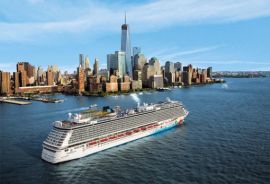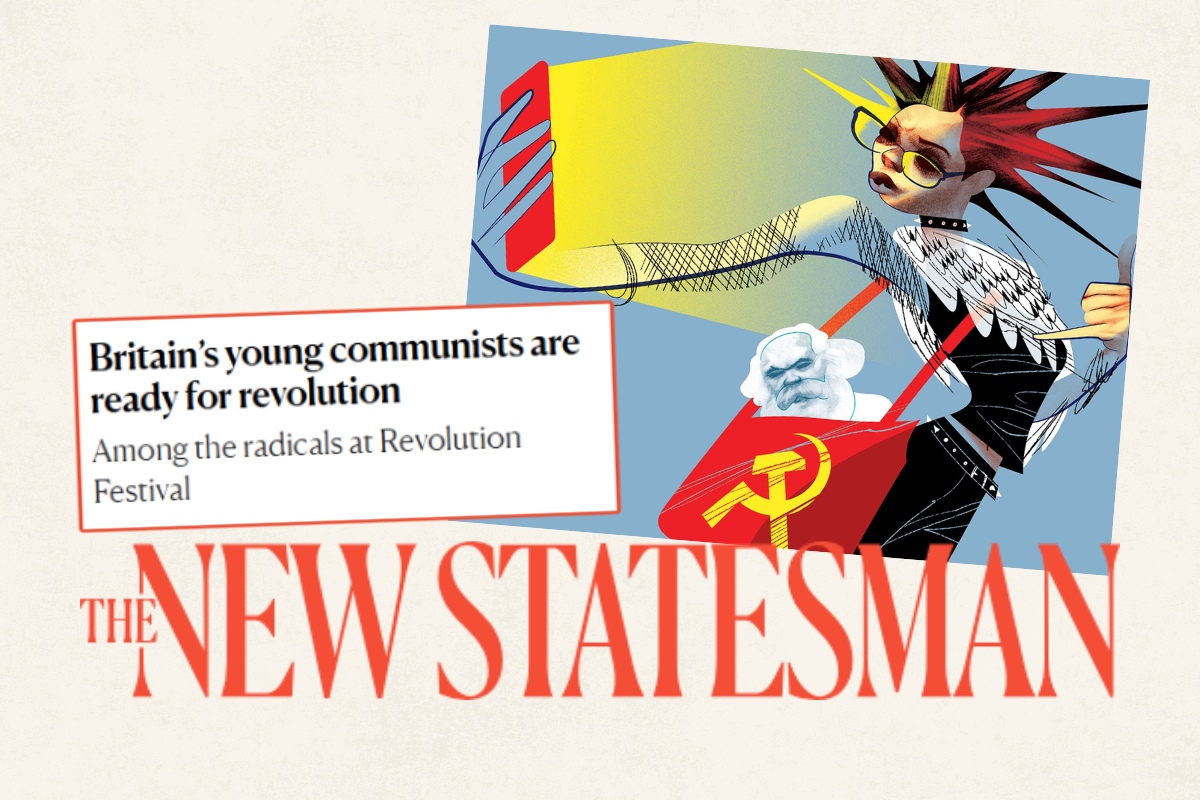We publish here a report from a worker who recently spent three months upon a cruise-liner, who explains the horrific and exploitative conditions within this highly profitable section of the tourism industry. Whilst workers toil below the deck, the owners reap in the profits.
We publish here a report from a worker who recently spent three months upon a cruise-liner, who explains the horrific and exploitative conditions within this highly profitable section of the tourism industry. Whilst workers toil below the deck, the owners reap in the profits.
Where will you spend your summer holidays this year? Will it ‘costa’ packet on the Spanish coast? Or how about a traditional English break at one of the great Victorian seaside resorts of Skegness, Selsy Bill or Bracklesham Bay? Perhaps you’ll just watch the kids camp out on the lawn, having the odd BBQ treat like last year; or even, like a great many of the burgeoning British underclass, you’ll just content yourself with camping on the couch with a few more bottles of ‘cider with no apples’ and back-to-back episodes of The Jeremy Kyle show….?
Well, no disrespect to fans of Jezza, or cider drinkers either, but if that doesn’t ‘float your boat’ then you could try working on one instead. Yes that’s right, according to the world’s leading cruise-line company: “A sea of opportunity awaits, set sail on a fun career”. Well, I did precisely that last year, spending three months in total with the worlds largest cruise line operator in the ‘sun and fun’ of the Caribbean. But in the context of the current global crisis of capitalism, for the majority of workers living and working ‘under stairs’ on a ship, the lifelong dream of sailing in the Caribbean is not all its cracked up to be: unfortunately, the ‘pirates’ are not confined to the reels of Hollywood fantasy.
Big ships; big business; big profits
The cruise ship industry represent billions of dollars internationally in terms of revenue, capital investment, and of course, profit: its reckoned from several sources that cruise tourism has been one of (if not the) fastest growing sections of the global tourist industry for thirty years. Recent figures would seem to support this claim, with anticipated passenger numbers worldwide for 2015 at 22.4 million, revenue at US$240 per day per passenger, and spending in ports at $15 billion a year (source: Cruise Market Watch). The worlds largest cruise ship operator, Carnival Corporation, comprises eleven individual cruise line brands, and a combined fleet of over one hundred ships (with seven new ships on order); they service nearly half of all cruise passengers worldwide with a declared 2012 revenue of $15.4 billion. According to the Florida-Caribbean Cruise Association (FCCA), the current cruise ship order book from 2013-2016 (new builds), constitutes $9.5 billion of capital investment – no small potatoes. Suffice to say that ‘cruising’ is big, big business.
And what’s the attraction you may ask..? Well, a bit of a daft question you might say; I mean, who wouldn’t want to go on a cruise right..? Once the preserve of the wealthy and privileged, the truth is that cruises are now comparatively cheap – yes, cheap. Carnival Cruise Lines (CCL, one of the eleven brands of Carnival Corporation), can offer you a five day Caribbean cruise, including three destinations, for a start price of just a little over $200 per person; and with an estimated 75% of all cruise passengers embarking in North America (source: FCCA) its not difficult to see the attraction: in the middle of a global crisis of capitalism, with austerity, cuts, rising prices and falling wages, swathes of American working class and lower income couples and families are flocking to the Caribbean.
Now it is true that CCL are the “Funship” cruise line (that’s low-brow and down-market to me and you), and you certainly won’t get a $200 stint on the Royal Caribbean for example – but that’s precisely how the market is being organised. Mr Greedy Capitalist is no fool, and having this sort of brand differentiation in dividing the market ensures maximum potential occupancy per boat, with CCL being one of eleven brands belonging to the same corporation, including big brand names in America, Australia, UK, Germany, Italy & Spain. I’d say Carnival Corporation have pretty much got ‘all bases covered’.
Exploitation on board
Now this information is all well and good, but how is it relevant? Framing this within the context of the world slump and the global crisis of capitalism would seem to beg the obvious question – how can the likes of CCL offer such cheap cruises?
One reason is capacity: ships are getting larger and larger with some of the bigger ships on order capable of holding five and six thousand passengers. This is really an expression of Marx’s explanation about the concentration of capital and economies of scale within capitalist society: the more guests per boat, the greater the profits.
But the fundamental reason is much more straightforward, much more typical of your average capitalist, and essentially consists of this: the capitalist appropriation of the surplus value of wage labour. In plain English: the capitalist makes his profit by underpaying the workers for the value of their labour; the lower the wages, the bigger the profit. It’s that simple, and in the case of the cruise ships this manifests itself in the form of mass importation of cheap labour from Indonesia and the Philippines.
There is a great division of labour right across a cruise ship, from the officers at the top who are professional sailors, then senior management (and the corporate lackies), and skilled workers; then electricians, carpenters, engineers; and then ‘staff’ who are musicians, entertainers, shop workers etc.; further down the ladder are chefs, bar staff, waiters; and then, on the very bottom rung, and by far the largest section of the workforce, are the veritable army of cleaners, laundry workers and cabin crew – the people who essentially look after the guests.
The staff and crew of a ship are comprised of people from all over the world – on the ship I worked last year there were as many as sixty different nationalities . The pay structure on a ship varies immensely. As a musician you can earn $700/week; working in the spa or gym you might get a basic of $900 or $1000/month, with the opportunity of commission, as do the waiting staff (but without commission). If you work in the bar however, you get no basic wage and work for commission only, and that’s on alcohol sales alone. But by far the worst job is cabin crew, the ‘room maids’. As is customary in the US, tips and gratuities are given to the people who clean your room: on the ship this will be collected up front by the company upon embarkation, though ultimately still optional. This is because the only ‘wage’ the cabin crew get are your tips. This means for cabin crew on a quiet cruise who are working a half empty section, or if certain passengers didn’t like the way you folded their towels and revoke their gratuity, then that particular week you won’t get paid at all.
Glaring inequality
As well as huge discrepancies in wages there are glaring inequalities in conditions and ‘privileges’. For example, if you are staff (spa/gym/entertainer etc.) you have the dubious ‘privilege’ of using the passenger areas – bars, restaurants, shops (always good for the company to get some of their wages back!) – and you’ll work a few fewer hours a week and may even have a day off. However, for the vast majority of workers you must remain ‘below stairs’, out of sight and out of mind – unless of course you’re one of the veritable army of cleaners wandering around the ship, cloth/mop/vacuum in hand, constantly dusting, hoovering, wiping, mopping in a seemingly never-ending cycle of ship-shape cleanliness – this is a 24 hour phenomenon on the cruise ship!
Perhaps the most fascinating aspect of these glaring inequalities is the way it manifests itself as a microcosm of the global social division of labour – a sort of international litmus test of average workers’ wages across different nation states. The musicians, entertainers and staff would tend to be from more developed western capitalist nations – US, Canada, Britain; waiting staff were often Eastern European – Romanian, Croatian, Bulgarian – countries that have lower average wages and costs of living; and then we get to the bottom rung again, the cleaners, laundry, and cabin crew, overwhelmingly from the Philippines, Indonesia and the rest of Asia.
For workers from Indonesia and the Philippines, where $1-$2/day is the norm for millions, they flock to the industry with very little English and seemingly little awareness of workers rights or unionisation. To the capitalist, they are perfectly green and cabbage looking, just dying to be exploited. The potential, by comparison, for earnings to support their families far outweighs the despicable working conditions. These workers get given the worst cabins, in the bowels of the ship, some sharing one shower to two cabins with two people per cabin, and work by far the longest hours for the most sustained periods – on average 10-12 hours per day, 7 days per week, for 9 or 10 months at a time! These men and women (mostly men with wives and children), wrench themselves from their homes and families for nine months of daily drudgery, without a single day off, in order to send money back to provide for their families. At the end of their contract, they’ll go home for 2-3 months and afterwards begin the whole process again.
Modern day slave ships
The modern cruise industry gives new meaning to the term ‘slave ship’, where workers are enduring conditions comparable to being ‘in service’ in a stately home, employed by the English aristocracy over 100 years ago – only back then you’d likely get a day off once a month. The CCL enforces their will with the strictest of contracts; pages long with clauses under clauses, one of which states that you must agree not to engage in any ‘class action’: “you’re on a ship, you see, in the middle of the ocean. We must adhere to strict governance for your own safety”.
This justification is then backed by endless obligatory presentations on ‘service values’, ‘health & safety’. We even had a one on the threat of terrorism and how to spot suspicious characters by checking for sweaty palms and shifty looking behaviour and the like – this on the very first day! Employees are very literally harangued into pledging their undying commitment to the company philosophy and the “Carnival family values”, while the company CEO Gerry Cahill bleats from a screen projector the do’s and don’ts of being a ‘good family member’, before the unwilling participants are made to stand in a circle by senior management and say: “I’m committed, I am Carnival!” Let me reassure my readers that this author politely sat still and point blankly refused. Not all are so lucky, and all must participate in these endless repetitive sessions of what amounts to the corporate version of the Hitler youth programme. Participation is mandatory.
Furthermore, ships are registered outside the US in places like Nassau (tax free former British colony in the Bahamas) and Panama, meaning the ships are subject to slacker regulations and not subject to US labour laws. Rules and regulations are stated clearly in the company hand book (one in every cabin wardrobe, like a sick satirisation of the Gideon Bible, only half as funny…), dozens of pages long with every rule breach listed along with the accompanying sanction, many of which can be met with instant dismissal. Essentially, the company can hire and fire at will anyone who makes the slightest breach of contract or, most tellingly, anyone who may ‘present a problem’ – God forbid you offend a passenger or do anything to tarnish the company name.
Workers are actively encouraged to snitch on each other and to report any problems to management, however insignificant, as employees are treated as infants, unable to resolve any issues themselves or collectively. This policy is justified on the basis of ‘cultural differences’ and ‘language barriers’ on the strength of the various nationalities on board.
Divide and rule
As we can see, its a simple case of divide and rule, with any complaints routinely handled with an ‘investigation’ carried out by security, with workers being coerced into writing reports on their workmates to corroborate complaints and/or aid ‘investigations’. Anyone who does ‘get the boot’ is unceremoniously ejected off the boat at the earliest convenience (first port), usually having only been told hours before they leave that they’re ‘no longer required’, and have a security guard assigned to them watching their every move, including accompaniment to the toilet, until they are safely in a cab to the nearest airport. Such is the paranoia of the company that someone might take vengeful action in a fit of vandalism or, God forbid, complain to a passenger.
The security on the ship have the last laugh; stringently adhering to the rules, unerring, unwavering in their idolatry of the ‘good book’, they’re nothing more than a private police force hired by the corporation to keep the workers in line. They patrol the ship constantly 24 hours a day, pulling up staff for every misdemeanour, from not wearing the ‘correct’ clothing to being in passenger areas without right or permission. At ports they search all crew when entering or leaving the boat and generally create an atmosphere of anxiety and animosity among a great many staff and crew. They are responsible for cabin searches, enforcing alcohol restrictions, collecting ‘contraband’, drugs testing, and enforcing every stitch of the rule book, from which stool you can/can’t sit on in passenger areas, to making sure you’ve got your shirt tucked in when you enter the nightclub.
For a great many, the conditions are harsh. Everyone’s favourite pastime is sleep. For others, it’s the trip of a lifetime. Many come back year after year; it’s a steady job, if you keep your nose clean. But the faces of the crew tell the real story. Everyone has a complaint about something, and it’s always directed at the company and its treatment of workers in some form or another. The cruise ship experience is characterised by a deep rooted and disconcerting ambivalence. For the poor workers from Asia, it is a lifeline for their families back home, where day-to-day conditions resemble that of medieval history books here in the advanced capitalist West.
As a working class lad and a socialist, I made a point of befriending many of the staff and crew, as is my habit in life, having been born and raised in a mining community. One lad, who was cabin crew from Indonesia, I would stop and talk to everyday on my way to work. His English was very good, which was not all that common among many workers. This particular day he looked glum and was complaining and cursing about the Gold and Platinum ‘loyalty’ card passengers, saying they always took their tips back and how he wouldn’t make any money that week.
I took a minute and explained to him that I understood his dilemma, but that, despite the Scrooge like actions of the guests, it was, in reality, the company that were to blame; that really his employers should be paying him a wage regardless of what the guests do. I wish I could have filmed his reaction, the look of realisation; that sudden dawning of consciousness was a deep delight to me. My friend made that important first step of looking at worker-boss relations in a completely new light that day.
Workers of all countries: unite!
These human beings, these humble and generous people from Indonesia and The Philippines and the like, have not had the hard schooling of industrial relations, strikes and pickets, unionisation, etc. and are the perfect resource for capitalist exploitation. The capitalist will always build where the labour is cheapest and least organised – that’s why the West has suffered such de-industrialisation for decades, and in the case of the cruise industry, it’s an even better deal for the slave-owners – they just import their labour, en masse.
Organising workers in this type of industry represents an enormous challenge and immense difficulties. On a ship you’re isolated, policed, and any ‘class action’ is tantamount to mutiny – a serious crime by international law, and the ‘good handbook’ states, quite clearly and unequivocally, that any ‘criminal’ activity will be dealt with by the authorities, and if necessary the FBI!
It’s unpleasant, to say the least, to have to earn your crust under constant threat; though, in actual fact, in capitalist society that’s what we all do to a greater or lesser extent, every day of the week: the threat of falling wages, zero-hour contracts, rising costs, house repossessions and the drudgery and pauperism of the dole.
What did I learn from the conversation with my friend? That there are millions out there ready and willing to fight. If we all stood up and stamped our feet at once, the earth would shake this system to the ground! There are over 350 million people in Indonesia and the Philippines – if we can only reach out to them and explain, as I did to my friend, that it is the bosses who are at fault; that it is the bosses who exploit us for their gross profits and exorbitant lifestyles; that they, the workers, are part of the international working class; that if we stand together united in a single purpose then we can rid this world of slavery for good and all! Workers of the world unite for the international socialist revolution!






